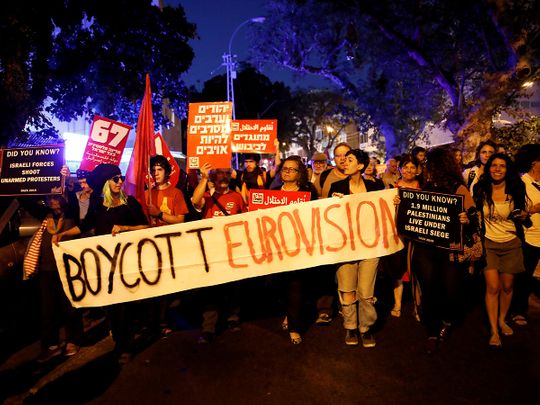
DENPASAR, INDONESIA: I’ve been trying to find the positives in the current coronavirus crisis. It seems to be a constant list of closures, infections, a shutting down in life as we live it. Everywhere we are being asked to take precautions, change our habits, stop our interactions, engage in social distancing.
I found good news in the fact that among all of the cancellations and postponements, there is truly good news indeed. The Eurovision Song Contest has fallen victim to Covid-19
If you’re unfamiliar with it, it’s an annual singing competition organised by Europe’s broadcasters along with Australia – don’t ask – and Israel, simply because Arab nations rightly won’t let it be part of their federation.
It is a cringe-fest. It is cruel and unusual punishment on the ears. If the United Nations had any sense, it would designate the Eurovision as a crime against humanity, and the International Criminal Court should prosecute anyone who puts together an entry. If you don’t know what Russian rap or Albanian folk sounds like, 10 seconds of torture tuning in will tell you all you need to know. You can make more music with a piece of string and a scrubbing brush than is made by some of the entrants. It’s so bad that the Americans wouldn’t even inflict it on General Noriega when they were trying to round him up. I think I’d rather listen to the sonic waves coming from the embassy in Havana than have to listen to one bar of Croatian crooning or Portuguese yodelling.
It’s all horrendous, so instantly forgettable, with about as much cultural significance as a disposed tissue.
And it has been cancelled. Yes! How good is that!
Maybe it will be one of those things that won’t be resurrected when life returns to normal.
Maybe it’ll be forgotten about, like 8-track tapes the size of paperbacks, 78 RPM recordings on fragile vinyl and Betamax video tapes.
If authorities are serious about enforced social distancing, how about putting as much distance as possible between a person’s ears and the howling and screeches that were passed off as musical composition in this competition.
What if there were aliens listening out for radio waves looking for intelligent lifeforms somewhere out there in the vast void of the universe. There’s a very real danger that the radio waves from the Eurovision broadcast might make it to the furthest reaches pf outer space. Some alien listening station might pick it up and hopefully dismiss it as background noise because it couldn’t possibly be from an intelligent life form light years away on our little blue planet circling our sun.
This is a competition in which a turkey-shaped hand-puppet sitting in a shopping cart actually represented Ireland one year. How embarrassing is that? Imagine a nation that produced U2, Chris De Burgh, Hosier and Snow Patrol being represented by a stuffed toy.
The only thing that was anyway exciting was listening to how each jury in the capital cities across the continent awarded their points. It was a lesson in geopolitical relationships that provided empirical evidence to the prejudices that prevail at any given time. The Ukrainians wouldn’t vote for the Russians, the French wouldn’t vote for the Germans, no one voted for the UK. Maybe not so blatantly, but there have been studies by political scientists and researchers on the way jury votes are distributed.
This is a contest where a bearded cross-dressing crooner from Austria won. And that’s a far cry from a competition in its early days that was taken seriously, gave ABBA its start with the winning song Waterloo in 1974, and had a very young Celine Dion from Quebec represent Switzerland and win it in 1988.
But that was before it deteriorated into a dog and pony show where the animals sang. When Covid-19 passes, let sleeping dogs lie. No more Eurovision, please. PLEASE!
Mick O’Reilly is the Gulf News Foreign Correspondent based in Europe








